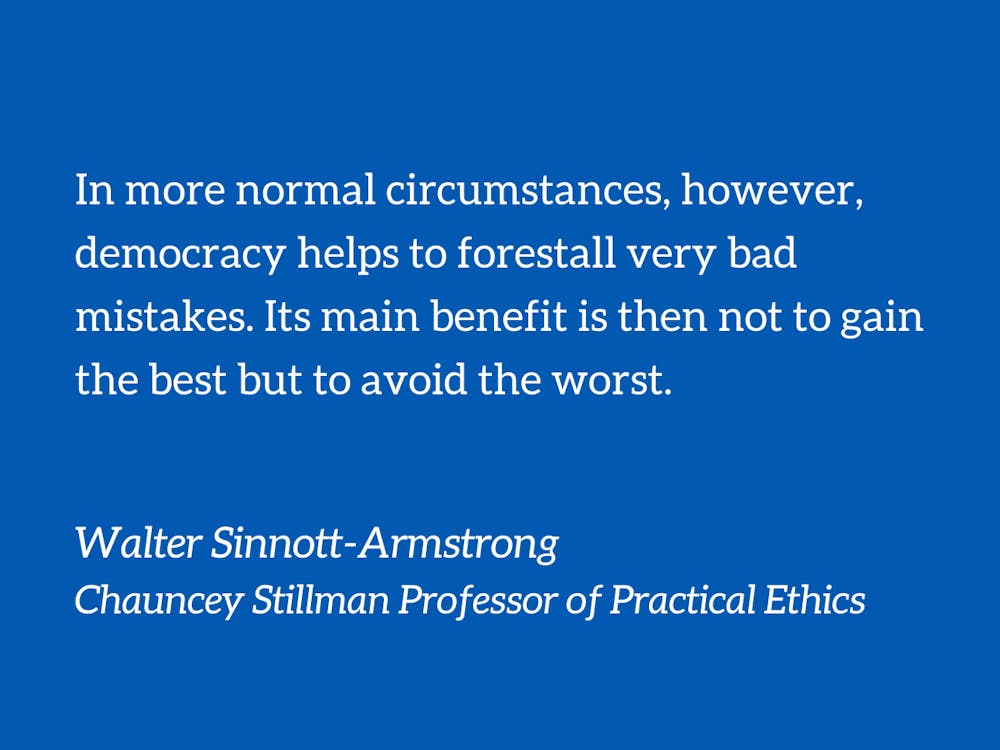Plato ranked democracy as the lowest form of ordered government. Hitler gained power through democratic processes. The majority of voters in the United States at one time supported slavery. With this tainted history, why do so many people fear what they call undemocratic?
Democracy is, perhaps, not at its best in crises when a government needs to move quickly to avert a catastrophe, such as climate change. It might be too slow and messy for emergencies in wars and epidemics. In more normal circumstances, however, democracy helps to forestall very bad mistakes. Its main benefit is then not to gain the best but to avoid the worst.
In particular, democracy reduces the risk of violent revolution. When leaders are elected, the majority favors them and most of their policies, at least initially. If they later adopt undesirable policies, those who could vote see themselves as responsible for giving their leaders power. They also know that they will get a chance to remove their leaders without resorting to violence, if they can convince other voters in the next election. Admittedly, there have been violent rebellions in democracies, such as the U.S. Civil War, but they are less common than in monarchies and oligarchies.
Democracy also reduces aggressive wars. Democracies do fight fiercely to defend themselves and their allies, but they tend not to start offensive wars. The reason seems simple: most citizens are reluctant to go to war unless necessary, if only because they do not want themselves or their family or friends to be injured. Military destruction harms most voters, so true democracies throughout history have rarely attacked their neighbors without provocation.
In addition, democracy fuels moderation. In dictatorships and monarchies, activists need to convince only one person — the dictator or monarch — in order to convert the whole government to a radical ideology that is shared by only a few people at one extreme end of a political spectrum. When political power is spread among only a few oligarchs, it is still relatively easy to persuade enough of them to become zealots. But when all citizens get to vote, extremists need to convince a much larger number of people, most of whom have common sense and share values that speak against extreme positions.
If an extreme liberal runs against a moderate liberal in a general election, the moderate candidate’s position is closer to the views of most people, so the moderate is more likely to win. The same goes for an extreme versus a moderate conservative. And even though extremists sometimes win, more moderate elected officials can then exercise checks and balances to keep the extremists from going too far.
Admittedly, moderation is not always better than extremism, and some widely-shared views (such as support for civil rights) have been mislabelled “extreme” by their opponents. Nonetheless, radical policies that only a few people support are often dangerous, partly because their effects are unknown. Democracy helps to reduce these dangers.
Wait a minute! The United States today is a democracy, isn’t it? Aren’t extremists getting elected today in the United States? Isn’t there some risk of rebellion today in the US? Yes, but why? The answer is complex, but one part seems to be non-democratic features of the current U.S. government, including gerrymandering and voting restrictions (which undermine equal votes for all), the Senate and the electoral college (which give more power to people from small states), the Supreme Court (which calls corporations people and allows the rich to buy elections) and widespread misinformation and deep fakes (which prevent citizens from voting for candidates whose policies they really prefer). The sad fact that democracy can be weakened in these and other ways does not show that democracy is no good when it is done right.
This argument for democracy — as the best way to avoid the worst outcomes — should appeal to conservatives, because reluctance to change tradition is basic to conservatism, as it has usually been understood. That reluctance stems from a fear that quick radical change is likely to be very harmful. Democracy helps to avoid precisely the kinds of costly mistakes that conservatives fear.
The same argument should also appeal to liberals and progressives, because the worst-off in society are usually the ones who get sacrificed when dictators, monarchs and oligarchs gain power. The poor are forced to fight in wars, while the rich stay at home and make money from arms sales. When industries suddenly die out, workers lose their jobs and often lack training to find new ones, but owners can quickly sell their stock and invest in new businesses. In such ways, the poor and powerless predictably pay the price for quick changes, so they benefit when democracy slows things down. Liberals, progressives and others should like that.
For these reasons, I hope that both sides of the political spectrum can agree that democracy is valuable and worth fighting for. Undemocratic policies are simply too dangerous.
Walter Sinnott-Armstrong is the Chauncey Stillman Professor of Practical Ethics in the Department of Philosophy and the Kenan Institute for Ethics. This piece is part of the “Virtues of Democracy” column, a series of op-eds by faculty and student contributors across Trinity College and the Sanford School of Public Policy. The column typically runs on Tuesdays or Thursdays.
Get The Chronicle straight to your inbox
Sign up for our weekly newsletter. Cancel at any time.

